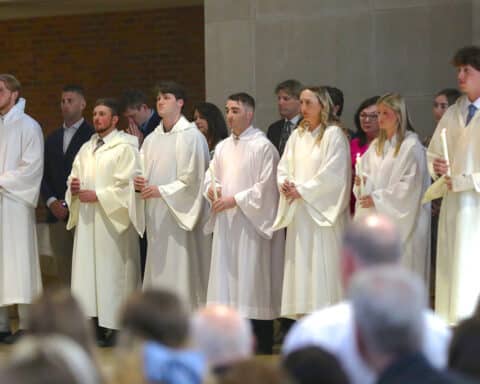Kids’ toys were scattered around on the floor. Dog hair had blown into corners (we had shedders). Books were stacked in almost every room in the house, and baskets of laundry set on any flat surface. Dust had settled on any uncovered flat surface. That was the house we had to clean when company was coming.
Not because we wanted to impress them. We didn’t invite people into our home that we felt we needed to impress, because those people weren’t friends or friends in the making. We cleaned up the house, and attempted to clean up the children, because we wanted to honor our guests. We wanted to be at our best for them. They honored us by coming.
We didn’t need to clean up for them. Every one of them would have accepted, without thinking about it, two flustered parents explaining that they couldn’t get the house clean but please come in; sorry for the doghair; let me move those books; here’s your chair; here’s the snacks and here’s your drink, and how are you doing? We all do something similar in Lent.
Getting ready for the guest
It feels natural to work to be at your best before the arrival of a guest, someone who’s honoring you by coming to you. You stop going on as you were going and make things nicer. You clean up and dress up.
The Church’s two penitential seasons give us set seasons to do both, with each focusing on a different aspect. In Lent we focus on cleaning up and in Advent on dressing up.
The end of the seasons forms the seasons’ characters. Lent points to Good Friday (and only after that, Easter). Advent points to Christmas. You get ready to witness an execution differently than you get ready to greet a newborn child.
Of course both seasons involve both operations. Cleaning up leads to dressing up and dressing up requires cleaning up. But you pay attention to different aspects of yourself and the world in different seasons. That’s part of the genius of the Church year.
On Wednesday, we begin the cleaning season. We need cleaning, that we should know. That we need help getting clean, that we should know too. Not that everyone does. Not that some of us always remember.
The reality of sin
G.K. Chesterton in Orthodoxy called sin “a fact as practical as potatoes” and noted that the world’s religions began with this insight, however they defined clean. “Whether or no man could be washed in miraculous waters, there was no doubt at any rate that he wanted washing.”
He was wrong in saying “no doubt” in the sense that many people doubt it and many people don’t see it at all. Those who do see it, who know there’s something wrong with them, should experience Lent as a gift. They should see the inside of the church on Ash Wednesday with the joy and relief that someone who’d been camping and hiking for two weeks in the hottest days of August sees the shower.
C.S. Lewis explained the desire to clean up in his argument for belief in purgatory in “Letters to Malcolm: Chiefly on Prayer.” “It would break our hearts if after we died, God said that we were dirty and stank but come on in anyway. Should we not reply, ‘With submission, sir, and if there is no objection, I’d rather be cleaned first’?”
The truth about ourselves
People seem to be spread out on a spectrum between a neurotic feeling of sinfulness and worthlessness and a delusion of goodness and satisfactoriness. Most of us, I think, slide between the two, though generally staying closer to one pole than the other. Lent tells us that we are sinful but not worthless and that we are good but not satisfactory. It places against both delusions the reality that God created us in his image, but that for various reasons we deface that image and deny Jesus’s love and make a mess of ourselves. It then adds the welcome news that, fortunately for us, Jesus loves us so completely that he chose to die in agony to save us.
The whole thing tells us the truth about ourselves: We need cleaning up; we need (assuming God’s care) to do what we can to clean up, even if we can’t do very much. It tells us the Church provides a way. But then it works its way to telling us, through the words and rites of Good Friday and Easter, that God has and is cleaning us up, and will someday clean us as clean as clean can be.





